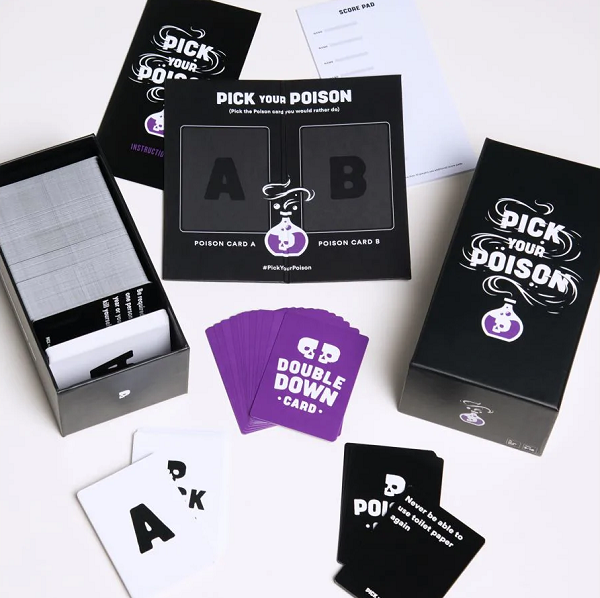Choose The Best Case Scenario in Pick Your Poison

Which would be worse? To wear zombie face paint at all times or to be trapped in a mine with 100 people for five days? And which would the other players consider to be worse?
Published by Player Ten, Pick Your Poison is a light party game for 3-16 players with a 30-60 minute playtime.
Gameplay
Each player takes an A card, a B card, and a double down card. The poison cards are shuffled and six are dealt to each player. Each poison card lists an unpleasant scenario such as ‘wear a bike helmet at all times’ or ‘always be running 30 minutes late’.
Players take turns being the judge. The judge picks one of his poison cards and places it face-up on the A space on the board. Each player reads the card and then selects one card in his hand to pass to the judge. Players are trying to choose cards that are roughly on the same level of unpleasantness as the card played by the judge.
The judge reads each card given to him aloud and then selects one to place on the B spot on the board. The person who gave him that card earns one point.
All the non-judge players then simultaneously choose to either play their A or B cards, indicating which scenario they would prefer, or at least which one they believe the majority will select. You may also choose to play your double down card, which will double your points if you choose correctly but you will lose the card for the rest of the game if you are incorrect. Everyone is allowed to ask the judge clarifying questions about the two scenarios. The judge is trying to balance the two cards.
Choices are then revealed. If all players chose the same card they each get one point, except the judge, who loses two points. If there is a split in the votes, the players who agreed with the majority each get one point. If there is a tie between the two choices then the judge gets three points and the other players get no points (if you are playing with an odd number of players then the judge also will pick an A or B card, but will only score points in the event of a tie).
The two played poison cards are then discarded, everyone draws back up to six poison cards, a new player becomes the judge, and the game continues. The first player to fifteen points wins the game.

Review
Pick Your Poison is pretty similar to a lot of party games but does keep players engaged and doesn’t leave all choices up to the judge. Every round, everyone is involved, everyone has a chance to score points, and it comes down to trying to read the table as much as it does trying to appeal to the judge.
We like the creativity involved in the judge’s role, not only as he tries to balance the cards, but also as players ask him clarifying questions. This leads to some of the game’s most amusing moments and does give Pick Your Poison a fun party game ambiance.
Despite the theme of the game, the cards do remain pretty family-friendly. A few had a bit of crude humor, but that seems pretty much to be expected given what the game is about, and it’s not to a degree that we felt uncomfortable playing. We appreciated that it was a game that could be played with families or adults. Although adults and children will definitely react to some of these scenarios in different ways.
The game box says it is for 3-16 players, but the sweet spot is somewhere in the middle of this range. You want more cards for the judge to choose from and more people to have to try to read than you’ll get with three players and, honestly, anything over 10 is just going to slow the game down far too much unless you change the point total you’re aiming for. In fact, the score pad doesn’t even go beyond 10 player names. With more players, it’s also going to be a lot more difficult for the judge to ever score those three points from a tie.
There are a lot of similar games out there. But if you’re a fan of this genre of party games, Pick Your Poison is a fun addition to it, with a clever scoring system. However, if you’re a bit tired of this style of game, it doesn’t quite bring enough new ideas to the table to be likely to win you back.
Pros: Scoring system, trying to read the table angle, can be played with families
Cons Too long at higher player counts, similar games out there
Disclosure: we received a complimentary review copy of this game.







